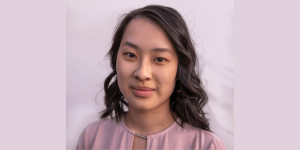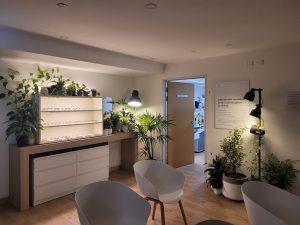1:30min
 In 2022, Optometry Australia sat down with Ellen Zhang and her partner Kyle Armstrong to discuss their eco-friendly practice, Ellen Zhang Optometry, located in Clayton, Victoria.
In 2022, Optometry Australia sat down with Ellen Zhang and her partner Kyle Armstrong to discuss their eco-friendly practice, Ellen Zhang Optometry, located in Clayton, Victoria.
Fast forward two years, and we had the pleasure of reconnecting with Ellen again to see how her practice has grown, and to explore her ongoing commitment to integrating sustainable practices into her daily practice.
Changes, challenges and successes
Reflecting on the past couple of years, Ellen shared, ‘The clinic has been successful and running well. It’s getting busier, and more patients are spreading the word. I’m looking forward to adding another optometrist here, to provide care on the days I’m not working. Having started a position teaching at Deakin University as well, time management is getting harder for me. Another major challenge has been trying to keep on top of social media and clinic updates, so that new patients are aware of the sustainability measures we have taking place. Currently, it’s only told to patients in clinic or through word of mouth.’
Looking back, Ellen noted that since she spoke to Optometry Australia, she’s seen a huge shift in the optical industry regarding sustainability.
‘There are much more open discussions now about what suppliers are doing, and how they are thinking about their impact. I have also heard amazing ways that other optometry clinics are going about with sustainability in their clinics and the little things we can all do to help. I think this is an exciting time for the industry and there’s always more changes to come.’
Rehoming frames with Reframe
The biggest and newest addition to Ellen’s clinic is the Reframe program, an initiative in store aimed at reducing waste and giving new life to donated frames before they go to recycling.
‘In an effort to reduce waste and give life to a frame before it gets broken down for material recycling, our clinic cleans, repairs and sanitises donated frames for re-lensing and rehoming,’ she said.
‘There is a display area of these free frames available for patients to pick from if they wish to, and if they don’t want to purchase a new frame. Patients only have to pay for new lenses to be inserted into the frames. We figured if we go to op shops and buy things second hand, why can’t we do the same with frames?
‘This is a free initiative by the clinic, and we don’t seek to profit from this scheme. We have just started to roll it out, so it should be interesting to see what the feedback is.’
Sustainable practices in optometry – why is it important?
 At the clinic, tackling the issue of plastic consumption still remains a top priority.
At the clinic, tackling the issue of plastic consumption still remains a top priority.
‘In optometry, plastic is almost embedded in every part of our world, from packaging, frames, contact lenses, equipment, PPE and more,’ Ellen said.
‘There is no one answer on how to completely remove it from the industry. We know that plastics can take hundreds of years to break down and degrade into smaller fragments – most plastics are not biodegradable, and so leach into our environment as microplastics. This is why it’s important that we consider our ways to reduce its consumption and consider how we dispose of our plastics and encourage our patients to also take on some of that responsibility too.’
However, change can start with a few small and easy steps.
‘For instance, with contact lenses, maybe we as practitioners recommend reusable lenses instead of disposables. Perhaps we offer incentives for bringing contact lenses for recycling, such as through Terracycle, or we talk about waterway pollution and careful disposal of contact lenses, rather than flushing them down the sink or toilet. Being more eco-conscious can start with just a few small changes.’
The impact it has on patients
‘As health care professionals, I believe we are in an important position to not just treat our patients, but teach them, inspire them and encourage them to learn and discover, not just about themselves and their eye conditions, but the issues that face optometry and its sustainability in all aspects, whether it be financial, clinical or environmental.
‘In our clinic, this is a continuing discussion with patients in practice, where we explain to them the options that are available to them. With glasses purchases, for example, we empower our patients and give them options to consider; they can come back, repair, reglaze or purchase the frames in store. If they want to choose frames elsewhere, that is an option too. This is all discussed in the consulting room before the handover to dispensing.
‘Patients are definitely on board, and some are surprised that sustainability is even an issue in optometry. It’s great having these conversations with not only parents, but their young children too who are also looking at new glasses or wanting to re-lens their existing pair. The excitement they have is fuel to have more of these conversations.’
Long-term sustainability goals
‘Like in the previous article, my goals are still to improve the business and reflect and implement new ideas and strategies that I come across. I want to still advocate and inspire others to do more, be it healthcare colleagues, business, government, organisations, friends and family.
‘So much has changed in the last two years but also not enough. Change only happens if we want it to, and we have to be our own advocates.’
Tagged as: Sustainability